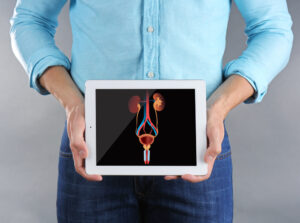What’s the difference between BPH and prostate cancer? The most important difference is that BPH, or an enlarged prostate gland, is not cancerous. It doesn’t mean you won’t ever get prostate cancer, but an enlarged prostate is a common condition as men get older. Let’s explain further.
BPH Explained
BPH stands for Benign Prostatic Hyperplasia, but is also known as an enlarged prostate.
The prostate is part of a man’s reproductive system. It is a small gland located under a man’s bladder, in front of the rectum, and it wraps around the urethra. Its purpose is to make the fluid part of semen.
It is an extremely common condition with 50% of men developing an enlarged prostate by their fifties. Because the prostate gets larger as a man gets older, it can squeeze the urethra causing trouble passing urine leading to uncomfortable and frustrating symptoms.
Common Symptoms Of BPH
Some men begin to have symptoms in their 30s and 40s, and others do not experience symptoms until they are older.
Symptoms include the following:
- Passing urine more during the day
- Needing to get up multiple time during sleep to pass urine
- Having a urgent need to urinate
- Urine flow becomes weaker
- Burning sensation when urinating
- Feeling like your bladder is never empty
Worst case scenario is BPH can lead to a weak bladder, back flow of urine causing bladder or kidney infections, and it can cause kidney failure.
Speak to your provider at Denver BPH in Denver, CO if you are experiencing these symptoms and discuss treatments to relieve the symptoms. It cannot be cured, but you can live your life without the urinary issues.
In case you were wondering, having BPH does not cause prostate cancer.
Prostate Cancer And Its Symptoms
It may take a while for any symptoms of prostate cancer to be noticed. It is a slow growing cancer and can take decades for cancer cells to grow and cause symptoms. It remains silent until the cancer begins to spread.
The other disconcerting fact is so many of the symptoms mirror those for BPH.
In addition to the above symptoms for BPH, look for the following symptoms of prostate cancer:
- Blood in urine or semen
- Painful ejaculations
- Nagging pain in the back, hips, or pelvis
- Pain when passing urine
- Difficulty having an erection
Contact Denver BPH at (303) 805-7477 if you are having any symptoms of BPH or prostate cancer.

